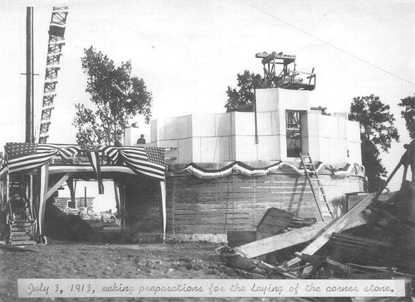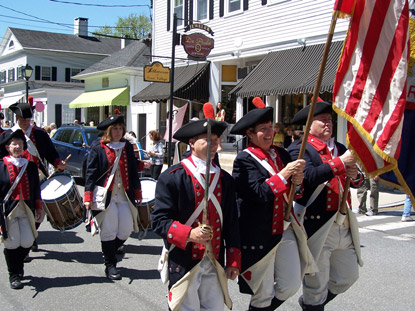If feelings of Anglophobia accompanied the post-1815 rise of American nationalism, anti-English prejudices quickly faded in the United States; and by the second half of the 1800s, they were replaced by a growing Anglophilia.
Changing circumstances and current demands—particularly the challenges of a world war—seemed to encourage former combatants to forgive and forget.
A Need to Forget

NPS
As the hundredth anniversary of the War of 1812 approached, Americans resurrected the history of Anglo-American war, but many focused particular attention to the postwar peace. “Since the close of the war the two great English-speaking nations have been at peace,” a New York Times feature proclaimed on June 12, 1912. Another article describing upcoming centenary celebrations in 1914 similarly emphasized not war but Anglo-American peace: “the end of the battle of Plattsburg [1814] marks the beginning of the century of peace.” On an earlier visit to the battle site, it was reported, the English ambassador had been impressed by “this unusual circumstance of victors and vanquished being buried together.” Townspeople in Plattsburgh had tended the graves of both sets of dead.
This rite of Anglo-American reconciliation—between the Blue and the Red—seemed to parallel the North-South memorial rites of reunion between the Blue and the Gray that had begun in the 1870s. These acts of reconciliation, small and large, required the cultivation of some memories at the expense of others. In both cases, the animosities and causes of “civil war,” which pit Britons and former British subjects, Anglo-North Americans, and then citizens of the United States against each other, were obscured, and commonalities, common histories, and common destinies were recalled. Changing circumstances and current demands—particularly the challenges of a world war—seemed to encourage former combatants to forgive and forget.
“The war to end all wars” was followed by another world war, and then by yet another major conflict in Korea. The War of 1812 further slipped Americans’ minds. By the sesquicentennial year of 1962, the War of 1812 had been more thoroughly forgotten; it was a mere footnote—and who reads the footnotes? A New York Times writer, Brooks Atkinson, commented, “Although the War of 1812 gave us our National Anthem, the celebrations of the current sesquicentennial lack exuberance. There’s a good reason. In the grumpy language of World War II, it was a colossal snafu.” Atkinson acknowledged, “After a century and a half, we can feel humorous about its many follies.” Perhaps in a more ironic age, the ineptitude and calamities that characterized the war were more easily acknowledged and the actual carnage devalued.
Quaint Remembrance

Jim Salemi/The Middletown Press
The commemoration engaged stalwart history buffs and was a boon to boosterism in those places, like Plattsburg or Baltimore, lucky enough to have once been sites of the war’s devastation. In 1964, Plattsburg, New York, staged its festivities during the week of July 4, even though its historic battle had occurred in September. (It was better for tourism.)
Perhaps the ultimate expression of the War of 1812’s trivial status and folly, conveyed with dollops of local whimsy, occurs today in coastal Connecticut, in festivals commemorating the losses of two towns, Stonington and Essex, invaded by the British in 1814. For nearly a hundred years, townspeople have celebrated the Battle of Stonington, in which a British naval squadron pounded the village with 50 tons of shells, rockets, missiles, and cannonballs. Miraculously, the bombardment caused little damage or bloodshed; on August 10, the townspeople declared victory and inaugurated an annual holiday, which has lagged at times but persists to this day. The April 8, 1814, invasion of Essex, Connecticut, was more costly, resulting in a short occupation and the destruction of 28 ships. On the second Saturday of each May since 1964, Essex commemorates the “Burning of the Ships” with its “Loser’s Parade” down Main Street and other festive events. The moral of the story is, perhaps, it’s not whether you win or lose, but how you forget the game.
Part of a series of articles titled Legacies: The War of 1812 in American Memory .
Last updated: April 2, 2015
